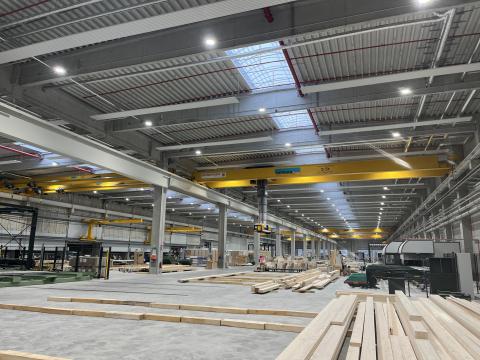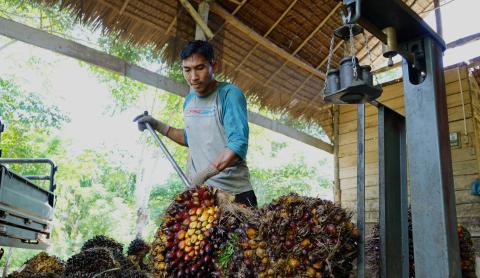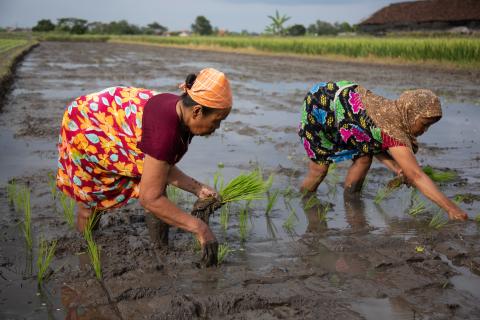Supply chain mapping – a step to mitigate risks of illegality in the Malaysian timber industry
The study “Supply Chain Mapping of Malaysian Timber and Wood-based Industries” seeks to provide an overview of the Malaysian timber trade and offer insights into specific supply chains in the timber sector. Malaysian timber companies, institutional investors and other stakeholders can use this study to mitigate the risks of illegally harvested wood entering into the Malaysian timber sector.
Concern over deforestation and degradation is particularly acute in Malaysia where forest covers more than 50% of the land area. It is crucial how Malaysia’s timber sector acts to secure well-managed supply chains which do not involve in illegal timber trade. This is not just relevant to protect forests, indigenous people and precious biodiversity. It is also about protecting the continued commercial viability of the timber sector in Malaysia.
Fresh supply chain data as key to facilitate stakeholder collaboration
Not only the Malaysian timber sector is connected to this issue, but stakeholders like the government, NGO’s and the financial sector in Malaysia are also concerned about sustainability and legality risks in the timber sector. Each of these stakeholders can impact the companies operating in the timber sector, but the question is how to create common grounds for these different stakeholders to positively influence each other in addressing legality and sustainability issues in the timber sector.
A key prerequisite for this process is to provide the stakeholders with insights to the often complex and in-transparent supply chains that handle Malaysian wood products.
NEPCon and MWIA staff interviewing companies for the Supply Chain Mapping session
Simply put, there is need for a thorough supply chain mapping of the Malaysian timber trade. This is exactly what this project has tried to do. By providing detailed supply chain information through this report, the project aims to provide stakeholders a clearer picture on supply chain risks in Malaysia. Interested stakeholders can use this information to manage the current practice or to influence each other in order to minimise the illegality risk in the supply chain.
The study was prepared by NEPCon and the Malaysian Wood Industries Association (MWIA), on behalf of WWF Malaysia. Eleven Malaysian companies participating in this mapping exercise have shared their sourcing strategies and experience in dealing with legality risks. They are timber traders, paper mills, and board and furniture producers.
Key results

Research team at the Wood Library at Forest Research Institute of Malaysia (FRIM)
Key export products - Furniture and plywood are the dominant export articles, as visible below. Pulp and paper, sawn wood and logs also make up a significant share of export earnings.
Export markets - Asia is the main export market for Malaysian wood products, with Japan consuming 50% of plywood exports. Japan’s growing focus on timber legality is a key concern for the exporters.
Most Malaysia’s plywood is produced in the state of Sarawak, which remains marred by governance, traceability and legality issues such as severe corruption despite some recent signs of change. The Malaysian Sarawak State Forest Department has urged timber licensees in Sarawak gain forest certification by 2017, if they wish to keep their forest concessions. This is part of the government’s efforts to improve the forest industry.
Areas lacking traceability - The study revealed that furniture and board producers typically have very limited supply chain traceability.
A key reason for this is that they chiefly use low value plantation species such as rubber wood. These species are traded in large volumes and by a large number of small local traders, which makes it very difficult to trace them back to the forest of harvest. Whilst these species are at a relatively lower risk of illegal harvesting, they are often mixed with multiple unknown species of ‘mixed tropical hardwoods’ for the production of board products. The species composition of supplies is rarely known and may change from day to day. Hence, proving the legality of composite products is a major challenge.
 The study shows a clear need for increased assurance for the dominant product exports such as furniture, plywood, pulp and paper, which often have opaque supply chains.
The study shows a clear need for increased assurance for the dominant product exports such as furniture, plywood, pulp and paper, which often have opaque supply chains.
Areas of stronger traceability - However, Malaysia still harbours vast tracts of natural forest where many hardwood timbers are legally harvested. These include Red Meranti, Yellow Meranti and Keruing. Traders of higher value hardwood logs and sawn timber often have more supply chain oversight or use third-party certification like Forest Stewardship Council (FSC) or Programme for the Endorsement of Forest Certification (PEFC).
Limited access - Whilst few pulp and paper companies were visited, desk research shows that these companies often import materials from high risk countries such as China, Indonesia, Korea and Taiwan for production.
A challenge, affecting the conclusions of the study, is that companies from the state of Sarawak declined to participate in the study. A key gap, considering that 60 % of timber harvested in natural forest derives from this state.
Banks as drivers of responsible forest management
The study pinpoints the risks that the banks are exposed to if they choose to invest in the forest sector. This enables them to shape their lending policies to keep the risk at bay.
“Malaysian banks must start to collaborate with companies about minimising the risks of illegal and sustainable timber in supply chains, in order to avoid fuelling deforestation. Bankers and companies can use the project’s supply chain data and proposed mitigation actions to set ambitious goals and milestones together,” says Nicholas Fong of WWF Malaysia.
“This will make supply chain transparency an urgent matter for the trade and create a step-change for our timber sector.”
Institutional investors should also increase the intensity of their due diligence/risk assessment policy and practices to engage and invest in companies which work with more transparent and lower risk supply chains.
Around 26 % of Malaysia’s forest area is certified either according to the standards of FSC or the PEFC-endorsed Malaysian Timber Certification System (MTCS). This provides a huge opportunity for investors and buyers looking for timber with an enhanced level of legality and sustainability assurance. And it could inspire other companies to follow.
Tailored training for bankers
Several Malaysian industries have expressed the need for the type of supply chain information that the project has provided. One anonymous industry member said,“…this study should be updated on an annual basis as it is a fantastic tool for potential investors, buyers and Malaysian forestry sector companies that wish to demonstrate their commitment to legal and /or sustainable practices”.
Based on the study, WWF Malaysia, NEPCon and MWIA plan to develop a Forestry Master Class tailored for the Malaysian banking sector. The training will educate bankers on the risks involved in providing finance to timber operators with poor transparency and inadequate due diligence in their supply chains.
“The Master Class will introduce and explain these risk aspects. And more to the point, we will present effective ways of dealing with them,” explains Mr Christian Schriver, NEPCon Southeast Asia Regional Office Manager.
“I am confident that this will fill a current gap and help the bankers become important drivers of responsible forest trade in Malaysia.”
> Learn more about the risk of illegal logging in Malaysia in NEPCon’s Forestry Risk Profile





